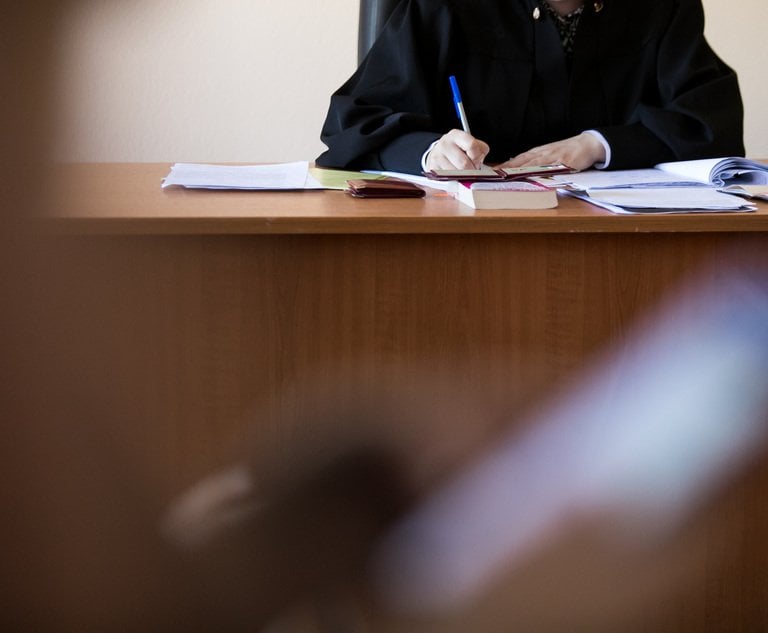Committee On Judicial Ethic

July 12, 2023 | New York Law Journal
Judicial Ethics Opinion 22-137A judge may not permit the court clerk to compile information for the sheriff's office about defendants who have missed court appearances, but may permit sheriff's office personnel to access court records in the same manner as other members of the public in accordance with applicable law.
By Committee on Judicial Ethics
8 minute read

July 11, 2023 | New York Law Journal
Judicial Ethics Opinion 22-136A part-time town justice may not simultaneously be employed part-time as a community school liaison with the county sheriff's office.
By Committee on Judicial Ethics
5 minute read

July 10, 2023 | New York Law Journal
Judicial Ethics Opinion 22-135A part-time judge, who also serves as a deputy town attorney for another town, may not in their role as town attorney assist the town police department in seeking Extreme Risk Protection Orders.
By Committee on Judicial Ethics
4 minute read

July 09, 2023 | New York Law Journal
Judicial Ethics Opinion 22-134May a county court judge permit their law clerk to run for and hold office as a county legislator in a county which is not contiguous to the county in which the judge presides?
By Committee on Judicial Ethics
2 minute read

July 06, 2023 | New York Law Journal
Judicial Ethics Opinion 22-133Where a judge knows their spouse retained counsel on a personal legal matter, and that attorney represents other clients before the judge: (1) During the representation, the judge is disqualified in matters involving that attorney, and must not preside unless the disqualification is properly remitted after full disclosure on the record. (2) Once the representation concludes and all fees are paid, and provided that the judge had no direct interest in the subject matter of their spouse's representation, for two years, the judge must fully disclose the former representation when the attorney appears, but may then preside as long as the judge can be fair and impartial. (3) After the two-year post-representation period, the judge has no further obligation to disclose or recuse.
By Committee on Judicial Ethics
5 minute read

July 05, 2023 | New York Law Journal
Judicial Ethics Opinion 22-132A judge may preside in matters involving the ex-spouse of the judge's fifth-degree relative. The judge's prior recusals, made during the relative's marriage, do not require recusal in all subsequent matters involving the same litigants.
By Committee on Judicial Ethics
6 minute read

July 04, 2023 | New York Law Journal
Judicial Ethics Opinion 22-131A town justice who is also a court clerk in family court may not preside over a justice court criminal case, where the defendant is also a party in a family court action involving similar allegations and the town justice previously heard allegations or testimony pertaining to that case in family court.
By Committee on Judicial Ethics
5 minute read
July 02, 2023 | New York Law Journal
Judicial Ethics Opinion 22-130(1) Where a judge's non-attorney child is employed as an assistant/"runner" with a law firm, the judge is disqualified, subject to remittal, whenever an attorney from the law firm appears in the judge's court. This obligation continues throughout the child's employment with the law firm. (2) The judge may not appoint attorneys from the law firm to fiduciary positions during the relative's employment with the law firm.
By Committee on Judicial Ethics
5 minute read

June 29, 2023 | New York Law Journal
Judicial Ethics Opinion 22-129 (Amended)A judicial candidate may not authorize a political party committee to solicit and accept campaign contributions on their behalf in lieu of forming a campaign committee.
By Committee on Judicial Ethics
5 minute read

June 27, 2023 | New York Law Journal
Judicial Ethics Opinion 22-128A part-time town justice may not maintain employment as an "asset protection specialist" for a large retail chain.
By Committee on Judicial Ethics
5 minute read
Trending Stories
- 1The Law Firm Disrupted: For Big Law Names, Shorter is Sweeter
- 2NYC Mayor Eric Adams Indicted on Public Corruption Allegations
- 3'I'm Staying Everything': Texas Bankruptcy Judge Halts Talc Trials Against J&J
- 4Conduct Board Urges 'Swift and Severe Punishment' for Phila. Judge's Facebook Posts
- 5What We Know About the Kentucky Judge Killed in His Chambers
More from ALM
- Morgan & Morgan Class Action Attorneys Detail Pathway to Success Within Cybersecurity and Data Privacy Practice 1 minute read
- Holwell Shuster & Goldberg Partners Leverage 'Hostile' Witnesses to Secure $101 Million Verdict Against Walmart 1 minute read
- Legal Speak at General Counsel Conference Midwest 2024: Mike Andolina, Partner, White & Case 1 minute read



